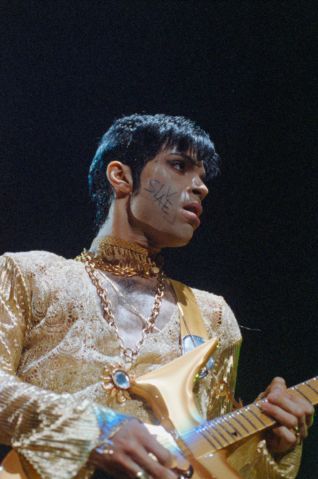
Source: Icon and Image / Getty
When you take a look back at the musicians who have had the greatest impact on music, Prince is near the top of the list. In a career spanning four decades (and nearly just as many albums during his lifetime), the multi-hyphenate artist transcended genres and generations.
One thing that should also be noted is how he was able to transcend.
Prince Rogers Nelson was an artist who took pride in his work. As such, he wanted to control how his work was presented and rewarded. As an early advocate of artists’ rights, he pushed back against the major labels, was an early champion (and later, critic) of the internet, and fought against illegal streaming and for equal pay for artists…even if it meant doing it solo.
The impact of the legend’s business moves is still being felt today, eight years after his untimely death at the age of 57. From Radiohead and Nine Inch Nails to Chance The Rapper and Megan Thee Stallion, many artists have learned a thing or two from the purple one when it comes to business.
Let’s take a look at some of the ways that Prince navigated the music industry in his own way.
1. One Man Band
A musical prodigy, Prince hit the ground running with his debut album, 1978’s For You. He did pretty much all of the heavy lifting: arranging, producing, writing, singing, and playing every single instrument on the album. Wanting to keep his process close to the chest, he even left his label, Warner Bros., in the dark. As reported by Billboard, when WB executives Lenny Waronker and Russ Thyret paid him a surprise visit, they quickly learned the hard way not to mess with his process. Waronker commented on how good the track “So Blue” would sound after the bass was added. Prince responded by kicking the label execs out of the studio. Let’s just say it wouldn’t be his last time beefing with the label.
2. Breaking The Chains
Source:Getty
Over the years, Prince would grow increasingly dissatisfied with Warner Bros., who fought against his desire to put out as much music as possible. Add the fact that Prince didn’t own his masters at the time, and you have an artist who has had enough. In perhaps one of the biggest public acts of rebellion, in 1993, Prince decided to change his stage name to the unpronounceable “Love Symbol.” The following year, he began performing with the word “Slave” written across his cheek and putting out albums at a rapid pace to quickly fulfill his contract.
“People think I’m a crazy fool for writing ‘slave’ on my face,” he told Rolling Stone in 1996. “But if I can’t do what I want to do, what am I? When you stop a man from dreaming, he becomes a slave. That’s where I was. I don’t own Prince’s music. If you don’t own your masters, your master owns you.”
The two parties mutually split in 1996. However, Prince eventually signed a new WB contract in 2014… with his masters as part of the deal.
3. Distributing On His Own Terms
In 1997, Prince became the first artist to sell albums on the internet, with his Crystal Ball box set being sold on his website through phone and website preorders. It ended up selling over 250,000 copies through traditional and non-traditional retail. He would take it a step further four years later with the launch of the NPG Music Club, releasing exclusive music, videos, radio shows and more directly to fans.
Over the years, Prince would continue finding different ways to put out music, from offering his Musicology album with concert tickets to putting copies of Planet Earth inside the Sunday edition of The Mail in the U.K.
4. The Internet: A Friend & A Foe
As much as he utilized the internet for putting his music out directly to fans, Prince also made it very clear that he wanted to be the one in control. In 2007, he announced plans to sue eBay, The Pirate Bay and YouTube for the unauthorized use of his music. He also made it a point to strike down any user that tried to use his music in any case, with his most notable case being one against a mother who posted a 13-second clip of her baby dancing to “Let’s Go Crazy.” The legal battle would stretch on for a decade before finally settling in 2018, two years after Prince’s death.
5. Make Streaming Fair For Artists
As he continued to fight for the fair compensation for all artists, Prince was, not surprisingly, not a total fan of music streaming.
“The internet is completely over,” he famously declared following the release of his 20Ten album, as reported by The Daily Mirror. “I don’t see why I should give my new music to iTunes or anyone else. They won’t pay me an advance for it and then they get angry when they can’t get it … They just fill your head with numbers and that can’t be good for you. Tell me a musician who’s got rich off digital sales,” he went on. “Apple’s doing pretty good though, right?”
Five years later, in July 2015, Prince famously pulled his music from all streaming platforms except for one. The lone streaming home for his music at the time was Jay-Z’s TIDAL, which exclusively released the final two albums in Prince’s lifetime, HITnRUN Phase One and HITnRUN Phase Two, in 2015. His music has since returned to all of the other platforms, but the fight for fair streaming pay for artists continues to this day.


